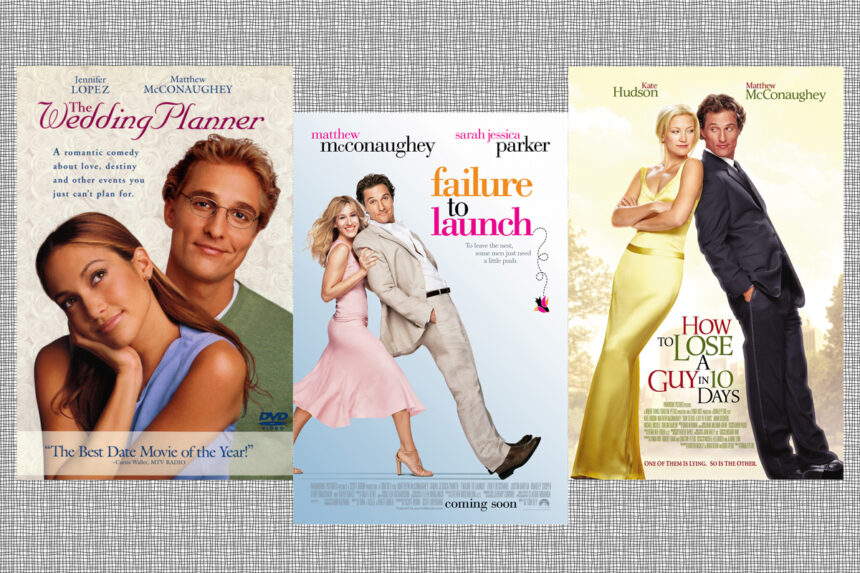Introduction: Defining the Early 2000s Rom Com Genre
Ah, the early 2000s—a time of flip phones, frosted tips, and rom coms that defined a generation. We were treated to an endless stream of romantic comedies featuring predictable plots, quirky sidekicks, and a soundtrack filled with catchy pop songs. Films like “13 Going on 30,” “How to Lose a Guy in 10 Days,” and “Sweet Home Alabama” became staples for movie nights.
But let’s be real: most of these films are utterly unwatchable by today’s standards. The characters often lack depth, the humor is cringeworthy at times, and the clichés? Well, they’re practically endless! Yet despite all this glaring evidence pointing toward their mediocrity—or perhaps because of it—we find ourselves clicking “play” whenever we stumble across these guilty pleasures.
So what gives? Why do we keep coming back for more when we know better? Join me as I dive into the complexities of early 2000s rom coms—the good, the bad, and everything in between—and explore why they still hold such a magnetic pull over our hearts (and remote controls).
The Problem with Early 2000s Rom Coms
Early 2000s rom coms often relied on clichéd plots and predictable endings. You could almost set your watch to the meet-cute followed by misunderstandings, all before a grand romantic gesture.
The characters were frequently one-dimensional. The quirky best friend trope or the suave love interest wore thin after a while. This lack of depth made it hard to connect with their journeys.
Moreover, many films perpetuated unrealistic expectations about love and relationships. They glamorized unhealthy dynamics as charming quirks instead of red flags.
The humor was often dated, leaning heavily on stereotypes that feel cringe-worthy today. It’s not just nostalgia; there’s an uncomfortable truth in how these narratives shaped perceptions of romance.
Watching them now can be like revisiting an old high school yearbook—nostalgic yet painfully awkward at times. Despite this, they remain oddly captivating for those who grew up with them.
Nostalgia and Guilty Pleasures: Why We Still Love Them
Nostalgia has a powerful grip on our hearts. Those early 2000s rom coms transport us back to simpler times, when life felt less complicated and love stories were lighthearted.
We remember the catchy soundtracks and iconic quotes. They take us down memory lane, evoking feelings of warmth and comfort. In a world filled with stress, these films offer an escape into whimsical romance.
Guilty pleasures often feel like secret indulgences. We know they’re not groundbreaking cinema, yet we can’t help but smile as we watch characters navigate their predictable arcs.
The chemistry between leads is both cringeworthy and charming. Their outlandish situations sometimes make us laugh out loud or roll our eyes in disbelief.
There’s something reassuring about seeing familiar tropes play out again. It’s a reminder that love—no matter how unrealistic—is always worth pursuing, even if just for an hour or two of pure entertainment.
The Negative Impact of Early 2000s Rom Coms on Society
Early 2000s rom coms often painted a distorted picture of love and relationships. They portrayed unrealistic standards that left many viewers chasing fantasies rather than genuine connections.
Characters frequently demonstrated shallow traits, prioritizing looks over substance. This obsession with idealized romance created pressures for individuals to conform to these narrow definitions of love.
Moreover, the lack of diversity in casting limited representation and perpetuated stereotypes. It reinforced the notion that love stories were primarily for a select demographic, sidelining countless voices.
As a result, audiences absorbed messages about what romance should look like—messages that didn’t resonate with real life. These films contributed to skewed expectations around dating and commitment.
In an age where emotional intelligence is vital, such portrayals can hinder personal growth and understanding in relationships. The consequences ripple through society as people struggle to find their authentic selves amid fabricated ideals.
Alternative Rom Coms: A New Era of Representation and Diversity
The landscape of rom coms is evolving, and it’s about time. New voices are stepping into the spotlight, bringing fresh narratives that resonate with diverse audiences.
These alternative rom coms feature characters from various backgrounds, sexual orientations, and cultures. This shift allows viewers to see themselves reflected on screen in ways that traditional films often neglect.
Stories like “Crazy Rich Asians” or “Love, Simon” showcase love beyond the conventional trope. They challenge stereotypes and embrace authenticity.
Additionally, these films explore modern relationships with a nuanced lens. Viewers can relate not just to romantic connections but also to friendship dynamics and family complexities.
As filmmakers break away from formulaic plots, they invite us into richer worlds where love is multifaceted. The rise of inclusive storytelling marks an exciting chapter for romantic comedies—one that celebrates all kinds of love without constraints.
Conclusion: It’s Okay to Love What You Love, But Let’s Move On from Early 200
Romantic comedies from the early 2000s hold a special place in our hearts. Their charm, humor, and sometimes absurd premises can be oddly comforting.
Yet, as we look back, it’s clear they are often problematic. The clichés and stereotypes might feel outdated today. We find ourselves cringing at scenes that once made us laugh.
Loving these films doesn’t mean we should ignore their flaws. Embracing nostalgia is fine—after all, it’s part of what makes them memorable.
However, there’s a wealth of new stories emerging now that offer fresh perspectives and diverse narratives. These modern rom coms resonate more deeply with today’s audiences.
It’s about time to explore those alternatives while still cherishing our beloved classics for what they were—a reflection of their era’s quirks and challenges.
FAQs
Q: What are some popular rom coms from the early 2000s?
A: Some of the most memorable titles include “13 Going on 30,” “Legally Blonde,” and “How to Lose a Guy in 10 Days.” These films have become iconic despite their problematic elements.
Q: Why do these movies feel unwatchable now?
A: Many early 2000s rom coms rely heavily on stereotypes, unrealistic portrayals of relationships, and outdated gender roles. Watching them today can feel jarring as societal norms have evolved.
Q: Can I still enjoy early 2000s rom coms?
A: Absolutely! While they may not hold up under scrutiny, there’s no harm in enjoying these films for their nostalgic value or comedic moments.
Q: Are there any modern rom com alternatives?
A: Yes! Recent releases like “Crazy Rich Asians” and “To All the Boys I’ve Loved Before” showcase more diverse characters and stories that reflect today’s world more accurately.
Q: Is it possible for future rom coms to improve representation?
A: Definitely. The industry is slowly recognizing the importance of diversity and inclusion, paving the way for fresh narratives that resonate with a wider audience.
Q: Where can I find current recommendations for romantic comedies?
A: Streaming platforms like Netflix, Hulu, and Amazon Prime often feature curated lists of new releases. Social media also buzzes with suggestions from fans eager to share their favorites.




